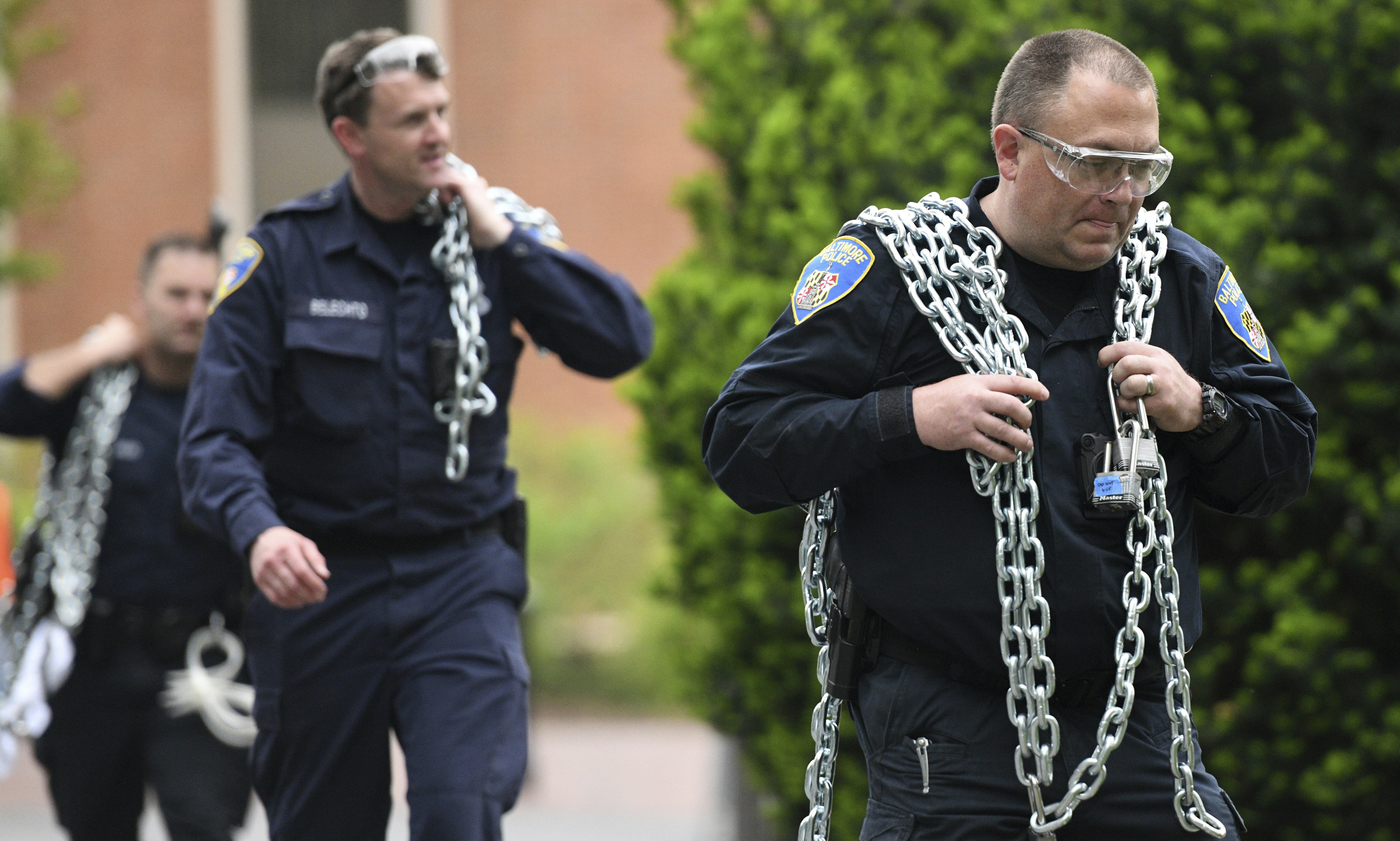
Police arrests end sit-in against policing at Johns Hopkins
BALTIMORE (AP) — Baltimore police arrested seven people on Wednesday as they ended a monthlong sit-in in the lobby of an administrative building at Johns Hopkins University, where a group of protesters have demonstrated against the creation of a campus police force and the institution’s contracts with the U.S. Immigrations and Customs Enforcement agency.
City police officers and firefighters “provided assistance” at the school’s Homewood campus shortly before 5 a.m. to reopen Garland Hall, the primary administrative building, the university announced. Protesters had chained the doors shut and blocked stairwells, defying a city fire marshal’s orders to keep the entrances and exits clear. Firefighters used an electric saw to get inside, finding a few protesters who chanted slogans like “No justice, no peace! No private police!” and sang decades-old folk songs.
The few who had locked themselves inside were escorted into a police van, their hands secured by plastic ties, as other protesters converged on the scene. Images broadcast early Wednesday show two protesters lying down on the pavement, trying to block the van’s exit. Another screamed at officers through a distorted megaphone. A few others tried to drape blankets over TV news cameras. It appears that four of those arrested were students at Hopkins, and three were not.
The Baltimore Police Department said its officers arrested five people for trespassing and two others for impeding vehicle traffic, but the city’s top prosecutor swiftly dismissed the idea of prosecuting them.
“No one arrested, student or community member, will be prosecuted,” said Baltimore State’s Attorney Marilyn Mosby’s spokeswoman, Melba Saunders.
Hopkins said “protesters and outside activists significantly escalated the situation” on May 1 by forcing the evacuation of students and staff from the administrative building. The school said the protesters also covered all security cameras and chained shut all exterior doors. This interrupted essential campus services, including support for students with disabilities, and raised concerns about the safekeeping of students’ personal and financial data kept inside.
“The university’s request for assistance was based on grave concerns about the unsafe circumstances in and around Garland Hall and followed multiple offers of amnesty from university officials and warnings from the police,” the university’s early Wednesday statement said.
University President Ronald J. Daniels and Provost Sunil Kumar had warned the day before that the protest constituted criminal trespassing and that any student who didn’t leave peacefully could be suspended or expelled.
Hopkins has long sought its own armed campus police force. A private research institution with one of the world’s foremost medical schools, it has three campuses in a city beset by intense violence, and currently depends on security guards and off-duty officers from the same police department that’s under federal oversight for patterns of abuse. After the Maryland legislature authorized the creation of the campus force last month, Daniels promised to build a department that is “constitutional, community-oriented, and publicly accountable.”
City Solicitor Andre Davis praised officers for how they handled the Wednesday incident, telling The Baltimore Sun that city lawyers reviewed the operation to ensure that it complied with Baltimore’s federal consent decree mandating sweeping police reforms. He said the law enforcers’ conduct “was a model of restraint, control and respect to the students.”
The protesters who chained the hall’s doors shut mainly object to the armed campus police force and the university’s contracts with ICE.
Hopkins has three ICE contracts totaling more than $1.7 million, all of which are set to expire this year, and it says the work has nothing to do with the agency’s role along the nation’s border with Mexico. It’s among various colleges being pressured to cut ties with ICE amid public outcries over the separation of migrant families.
Turquoise Baker, a Hopkins student who was one of the organizers of the Garland Hall protest, described their occupation as a “final stand” in their efforts to stop abuses by police, among other goals.
“This is an effort to protect black, brown, queer and all marginalized people who Hopkins is actively endangering,” she asserted, flanked by a dozen or more fellow protesters following the early morning arrests.
But Hopkins stressed it has gone to “extraordinary lengths to accommodate the protest” since it began over a month ago and attempted to engage with the demonstrators even though some forcibly took over the hall.
“We are unshakeable in our support of freedom of expression, which lies at the core of academic life. We had hoped to find a constructive means to resolve this increasingly dangerous situation, and we are disappointed that the decisions of the protesters necessitated a law enforcement response. We remain open to dialogue and will continue to support our students as we find ways to move forward together,” the university said.
___
Follow McFadden on Twitter: https://twitter.com/dmcfadd
The Western Journal has not reviewed this Associated Press story prior to publication. Therefore, it may contain editorial bias or may in some other way not meet our normal editorial standards. It is provided to our readers as a service from The Western Journal.
Truth and Accuracy
We are committed to truth and accuracy in all of our journalism. Read our editorial standards.
Advertise with The Western Journal and reach millions of highly engaged readers, while supporting our work. Advertise Today.












